Helping Children Move Securely Into the Future
For Ms Islinda Bte Idris, lead educarer from My First Skool (MFS) at Sembawang Shopping Centre, the willingness to go beyond to engage parents and share professional knowledge has helped her in building strong parent-teacher partnerships.
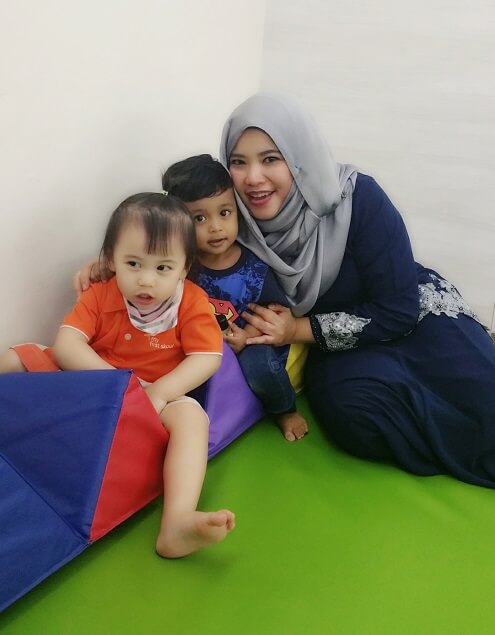
Ms Islinda Bte Idris (Teacher Linda), Lead Educarer, My First Skool at Sembawang Shopping Centre
When Mrs Nur Lydia's firstborn, Iman Maliq Muhd Firdaus, first turned one, he began to act up at school. He clung to his preschool teacher and got upset whenever she left his side. His teacher at My First Skool (MFS) at Sembawang Shopping Centre, Ms Islinda Bte Idris, or Teacher Linda, felt something was amiss and notified his parents.
Teacher Linda messaged me to say that Iman seemed scared to be alone, and asked me if anything had happened at home. She even asked us to come down to discuss if anything can be done, Mrs Lydia recalled.
Mrs Lydia explained that as she and her husband both held full-time jobs, they only spent time as a complete family once a week. Teacher Linda suggested that Iman needed more attention from them and encouraged them to increase the frequency of family time.
She also suggested for both parents to adopt a more consistent parenting approach with Iman and also provided some tips for them to try.
The method worked, and Iman quickly outgrew his clinginess, becoming more independent. Mrs Lydia added that situations like these have made her appreciate Islinda’s experience and knowledge as a teacher.
Islinda’s career in early childhood education spans 18 years, having moved into her most recent role as a lead educarer seven years ago. As a lead educarer, her roles go beyond daily activities like taking the children for indoor and outdoor play, as well as routine care activities such as showering, diaper changing and feeding. Islinda is required to take on more managerial tasks as a lead teacher, like the scheduling and integration of new teachers at the centre.
My First Skool adopts a relationships-based curriculum (RBC), which is based on developing strong educator-child relationships. “Under the old system, a few teachers collectively watched over a group of around 15 infants and toddlers. Now, each educarer is the main caregiver for a group of up to three to four infants/ toddlers at the centre,” Ms Islinda said.
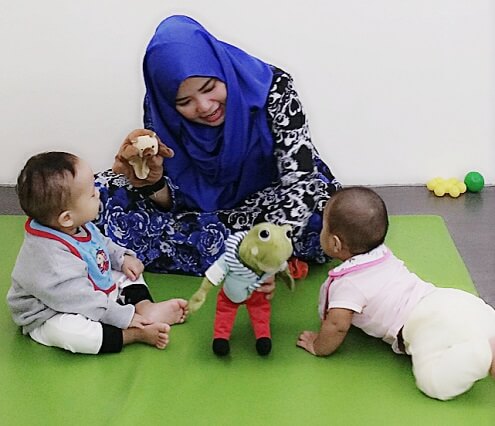 | 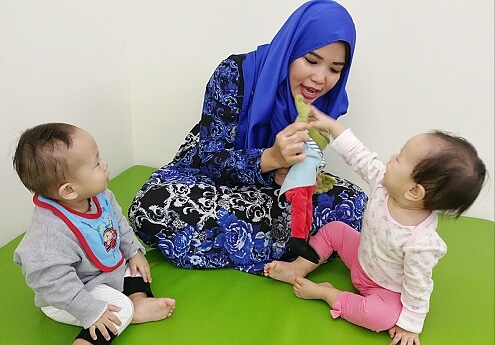 |
She explained that the children are divided by age group - two to six months old, seven to 12 months old, and 13 to 18 months old. Within these groups, the infant’s designated educarer will track their development under three domains: psycho-social, physical, as well as thinking and communicating.
Educarers will also document the moments when they observe infants achieving their developmental milestones.
“For example, we might provide them with different instruments to ‘play music’. From there, we will observe what the children can do with the instruments. We could give a young infant a bottle to shake and make a sound, and observe if the baby can complete the action,” she said.
In the event that the child is unable to perform the task, the educarer will assess the reasons and tweak the activity accordingly to help the child.
In the case of the “musical instrument” activity, Islinda said: “Perhaps the shaker is too big for the baby to grasp. We can then try to find a smaller one, or one made of a softer material that is easier to hold.”
This attention to detail and focus on finding solutions to help infants progress is another quality that parents like Mr Ng Chun Fai appreciate about Islinda.
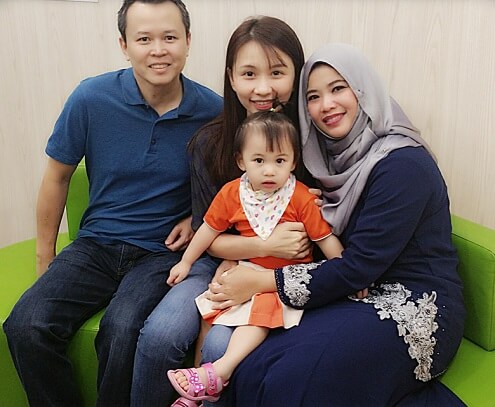
Teacher Linda with Baby Xiao Tang and her parents.
Mr Ng’s daughter, Ng Xiao Tang, first came under Islinda’s care when she’s just four months old. As a first-time parent, he recalled that he was initially nervous about leaving his child with a stranger.
“But when we handed our baby over to Teacher Linda, I had this feeling: ‘Okay, I think this teacher is suitable.’ She is very kind and she knows what she’s doing,” he said.
He was very encouraged by how Islinda was able to understand the level of development of his child and create activities to track her growth.
“Teacher Linda was able to do things similar to a doctor. She would use items to attract Xiao Tang’s attention to see if she could track these items or was interested in colourful things,” he said.
He was particularly impressed that besides regular updates on his daughter’s progress, Islinda was able to provide advice on what to do with Xiao Tang at home. For instance, when Xiao Tang reached the milestone of being able to flip herself over, Islinda was quick to warn Mr Ng and his wife to be careful if Xiao Tang was positioned at higher ground for activities like diaper changing.
“These are not general tips you get from a magazine. Islinda’s tips are targeted at Xiao Tang’s needs at different stages,” he exclaimed.
Xiao Tang, who is now 23 months old, progressed well through her developmental milestones. She also made a smooth transition to the toddler class without fuss at 18 months old. These were all possible with Islinda’s care and close teacher-parent partnership.
Mrs Lydia also noted how Islinda would go the extra mile to help parents track their children’s development.
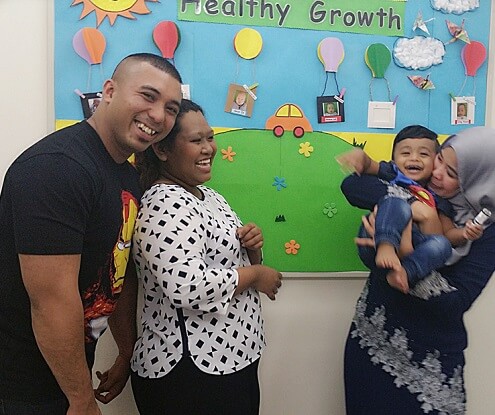
Teacher Linda with Baby Iman and his parents.
When Iman first learned to crawl, Islinda not only sent Mrs Lydia a message to describe Iman’s achievement, but also created a photo collage for her to keep. Though Iman has since moved to a new child care centre closer to his new home, Islinda still keeps in touch with the family, constantly texting to find out how Iman is adapting.
“Her involvement helps us better understand our son and know what to do. She doesn’t just play the role of a teacher, but also as a friend,” Mrs Lydia said.
She concluded: “I think this is what early childhood teachers should do – don’t make parents feel like you are just a teacher. When you can show us that you are willing to go beyond, you will really gain the trust of parents and children.”
.jpg?sfvrsn=a6ab515e_1)





